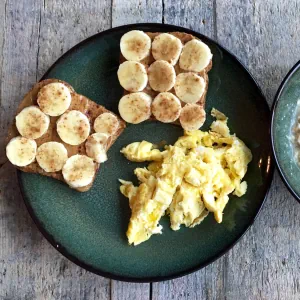
All
Food
The best approach to fuelling a young athlete generally falls into having an overall well-balanced diet. But there are a few points that we can follow and be aware of to help our kids be well prepared for the day.
- Categorygame-day
- Last UpdatedJan 2022
Let's not beat around the bush. We generally can pick the right food to eat but it takes longer to prepare, costs more and doesn't taste as nice.
Well, that's not completely true. It can taste yummy but our problem is that changing an established habit of loving fast food and instant snacks is a long road to preferring a whole grain, fresh produce and lean meat sandwich. Everything else is still true.
Our first goal should be to start that lifelong habit of healthy eating. Here we will go through some general points but keep in mind the entire diet is what makes a big difference to performance and health, not just game day efforts.
Pre-game
If possible you want to have breakfast 2 hours before turning up at the game. (Not so easy for those J8 players). Ideally what we need is to have that food to be mostly digested by the time it comes to warming up and the game.
Weetbix (fibre), fruit and nuts (complex carbohydrates), marmite (vitamin B) on whole-grain toast (fibre complex carbs) cooked eggs, baked beans (protein) - these are some good options to consider.
Avoid sugar! Adding sugar to your cereal or having a sugary drink is not helpful. Sugar has the effect of slowing down the digestive process and leaving food in the gut come game time. This may lead to a bloating and lethargic feeling for the player.
Here are 13 breakfast ideas taken from the New South Wales Institute of Sport.
- Wholegrain/high fibre cereal + low-fat milk or protein-enriched milk alternative
- Wholegrain toast + low-fat cheese – sliced, cottage, ricotta and tomato.
- Fruit toast + low-fat ricotta or fruit yoghurt
- Grain toast + shaved ham + tomato and mushrooms + avocado
- Wholegrain toast + eggs (poached/ scrambled/boiled) + Spinach + Avocado
- Porridge + low fat milk or natural yoghurt + crushed nuts or pepitas
- Bircher muesli + natural yoghurt + berries
- French toast + avocado + vege sides
- Smoothie with fresh fruit + natural yoghurt or protein powder + spinach/kale (or any other veg)
- Grain toast + baked beans and sliced cheese
- Omelette with spinach and mushrooms + toast or 125ml 100% fruit juice
- Grain toast + peanut butter or vegemite + a tub of yoghurt or an approved protein shake
- Green vege bowl with roast sweet potato and sautéed kale + poached eggs + flaked almonds
Glucose is simplist sugar and used by every cell (including the ones in the brian) to function. Fructose is the sugar found in fruits and comes with some extra nutrients. Sucrose is our table sugar and Lactose sugar is found in (natrual) diary products.
Sucrose and Lactose are complicated sugar structures and harder to break down.
During the game
Water is best. There is the practice of providing some sugary lollies for a sugar boost. This isn't a great idea. Since the sugar is locked up in the food it needs to be digested and the body shuts down the digestive system when performing exercise. So really you just end up with it sitting in the gut. Oranges and pineapple are good options as their (healthier) sugars are stored in the juice and so get absorbed quickly into the blood and so can work during a half time break.
For kids, we shouldn't be letting them think or rely on sports drinks as a go-to option for glucose replacement during a game. At junior level, the games are shorter and less intense compared to adult games where they may see this practice happening. The better focus is planning the pre-match meals.
Glucose (blood sugar and the simplist of carbohydrates) is the 'fuel' for our muscles. Our body stores glucose in the form of glycogen which is fast to access and convert to glucose but we have a limited storage capacity. When that capacity is full energy is converted to another long term storage, 'fat'. A very effecient storage but slow to release and convert. Replinishing that glucose during exercise is the aim of those sports drinks but too much and you may risk raisng the level in your blood and so insulin is released to supress the imbalance and this process happening during a game can affect performance.
Between Games
If you have multiple games in a day look to replenish right after the match. Go to your tent get some food, sit down and then have your team talk. Remember, food digestion is not immediate and the more time we can give our bodies to do it the better prepared we will be for the next game.
If you have under an hour between matches consider snack foods such as trail mix, oranges, pineapple, strawberries, bananas. A granola bar. Some chocolate in for that sugar craving. Plenty of water and again avoid the sports drinks until they are an older age.
If you have more time a good whole grain bread sandwich can be a good option to avoid those hunger pains (the body's cry that it needs replenishing) to get some replacement carbohydrates back into the body. Some protein like lean chicken or shaved ham is also a good option.
Be careful to avoid high levels/intakes of fat and sugar. Fat takes longer to digest and as mentioned, sugar inhibits digestive functions.
After a game
It's junior rugby, don't sweat it. Get some hot chips and a sausage from the Northcote Tuck Shop. If you have something to celebrate go treat them to their favourite food shop.
Ok, this may contradict our opening paragraphs but it's up to you to find the right balance for you and your young player.

